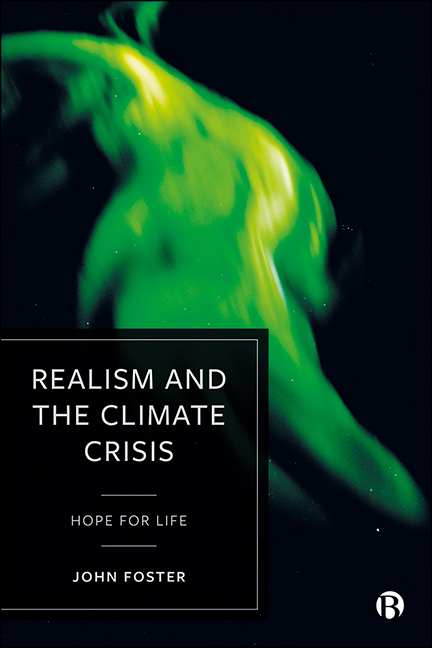Book contents
- Frontmatter
- Dedication
- Contents
- A Note on Notes
- Acknowledgements
- Introduction: Hope, Realism and the Climate Crisis
- 1 The Demands of Realism
- 2 Transformation?
- 3 Creating Possibility
- 4 Responsibility Beyond Morality
- 5 The Bounds of Utopia
- 6 Climate Crisis as Tragedy
- 7 On the Way to Revolution
- 8 The New Revolutionary Dynamic
- 9 The Vanguard of Hope
- Notes
- References
- Index
8 - The New Revolutionary Dynamic
Published online by Cambridge University Press: 15 September 2022
- Frontmatter
- Dedication
- Contents
- A Note on Notes
- Acknowledgements
- Introduction: Hope, Realism and the Climate Crisis
- 1 The Demands of Realism
- 2 Transformation?
- 3 Creating Possibility
- 4 Responsibility Beyond Morality
- 5 The Bounds of Utopia
- 6 Climate Crisis as Tragedy
- 7 On the Way to Revolution
- 8 The New Revolutionary Dynamic
- 9 The Vanguard of Hope
- Notes
- References
- Index
Summary
For all that I have been saying in Chapter 7, XR is evidently the nearest thing to a climate-driven revolution yet to have emerged in the advanced West, where the emergency must be decisively confronted if there is to be any future for humanity. It draws, as we have seen, on genuine energies of recoil, rejection and revolt. The importance of those energies cannot be overemphasized, but nor must their nature and dynamic be misconstrued.
We can bring out what is at stake here by reflecting on a characterization of Rebellion which might strike one, prima facie, as peculiarly insightful:
This opposition, which does not have the traditional class basis … is at the same time a political, instinctual and moral rebellion. … A strong revulsion against traditional politics prevails: against that whole network of parties, committees and pressure groups on all levels; against working within this network and with its methods. This entire sphere and atmosphere, with all its power, is invalidated; nothing that any of these politicians, representatives or candidates declares is of any relevance to the rebels; they cannot take it seriously, although they know very well that it may mean to them … going to jail, losing a job. They are not professional martyrs. … But for them this is not a question of choice; the protest and refusal are parts of their metabolism.
This emphasis on the ‘metabolic’ combination of ‘political, instinctual and moral’ motivational elements – the gut and the conscience working together – tells us something very important about XR's genesis. But the conjunction becomes still more revealing when we register that we have here not, in fact, a description of the current situation at all, but part of the neo-Marxist Herbert Marcuse's enthusiastic welcome for the student movement of the later 1960s. That is, or should be, uncomfortable as well as revealing, because we know what happened that time around. Those student protests, described unsympathetically but not unfairly by Alasdair MacIntyre as ‘more like a new version of the children's crusade than a revolutionary movement’, were an expression of typical adolescent discontent which happened to coincide with widening access to the protected space of tertiary education, increasing availability of contraception, the beginnings of the televised ‘media cycle’ and an easy target for moral outrage in the Vietnam War.
- Type
- Chapter
- Information
- Realism and the Climate CrisisHope for Life, pp. 137 - 153Publisher: Bristol University PressPrint publication year: 2022



